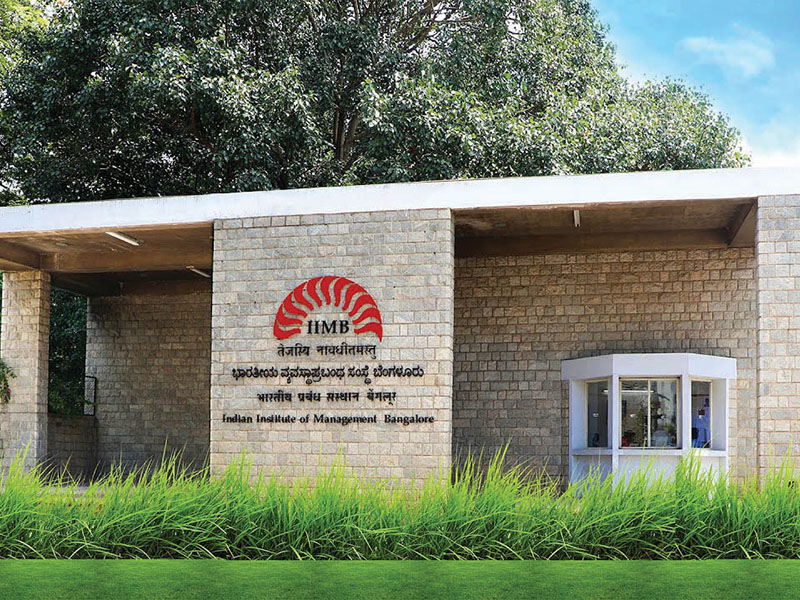Karnataka: Speech freedom row
Reshma Ravishanker (Bengaluru)
For the past year, the premier Indian Institute of Management, Bengaluru (IIM-B, estb.1973) — one of the original ABC (Ahmedabad, Bangalore and Calcutta) IIMs promoted by the Central government and routinely ranked among the global Top 50 B-schools by The Financial Times, London — has been experiencing faculty turmoil. Earlier this year in February, in an unprecedented disciplinary directive, the institute’s management issued a “gag order” against Prof. Deepak Malghan, an assistant professor of policy at IIM-B.
This was because an internal inquiry committee concluded that several tweets posted by him on social media platform ‘X’ (formerly Twitter) in February had “violated the institute’s service rules”. A month later, in March, IIM-B demoted him from the rank of associate to assistant professor.
Dr. (Prof). Malghan’s transgression is that he commented that several premier B-schools, including IIM-B, are flouting the Central government’s student/faculty reservation policy under which 22 percent of student capacity and teaching positions are reserved for Scheduled castes and tribes. Prof. Malghan challenged IIM-B’s gag order and rank demotion in the Karnataka high court, which stayed the order.
In October, this issue got new wing when 800 academics “from the across world” wrote an ‘open letter’ to the IIM-B management condemning the “long-standing vindictive harassment and persecution” of Prof. Malghan. In their letter dated October 23, 887 academicians wrote: “We strongly condemn the misuse of IIM (B) Service Rules to stifle academic freedom on campus. It is a great shame that a premier institute like IIM (B) is violating an internationally accepted set of rights to Academic Freedom… the recent “demotion” by IIM-B is the culmination of a series of persecutions that he has been subject to since 2018… we call upon IIM-Bangalore to immediately withdraw all sanctions against Dr. Deepak Malghan.”
Early sprouts of this confrontation manifested in 2017 for Dr. Malghan, an alum of the University of Maryland and a recipient of the VKRV Rao Prize for Social Sciences. That year, he co-authored an essay published in Economic and Political Weekly commenting on lack of faculty diversity in the IIMs. This article was followed up with a series of tweets criticising the country’s 21 IIMs for equity and inclusion deficiency. In 2018, he again invited the wrath of the management when he expressed solidarity with some students protesting against Hindustan Unilever for the company’s environmental pollution record.
Next year, Malghan wrote to the director of the top-ranked IIM-Ahmedabad querying why the B-school had not implemented the Union government’s SC/ST reservation policy in its Ph D programme. Last year in August, he was a signatory to an open letter addressed to corporate India urging it to protest “increasing hate and dehumanising speech and radicalisation” in the country. Perhaps drawing inspiration from Dr. Malghan, in January, Dr. Gopal Das, professor of marketing at IIM-B, accused the institute’s management of indulging in “caste discrimination”. An internal probe has been ordered against him.
IIM-B — a publicly funded institution — is reluctant to comment on this issue. Following several emails/phone calls, IIM-B emailed this statement to your correspondent: “IIM-Bangalore operates under well-established and faculty and Board approved Service Rules governing employee conduct, with any disciplinary action taken in accordance with transparent and well-defined procedures. The Institute is not in agreement with certain cause-and-effect relationships as mentioned in the letter, and as some aspects of the matter are sub judice we request all parties to refrain from speculation. Therefore, the Institute has no further comment currently.
Academics are quick to connect the “persecution” of Prof. Malghan with the larger issue of diminishing freedom of speech and debate on India’s higher education campuses. Especially since the BJP government was swept to power at the Centre in 2014 and in several states. In March 2021, renowned public intellectual Dr. Pratap Bhanu Mehta resigned from the position of vice chancellor of the high-ranked Ashoka University, Sonipat, reportedly because the management of this privately-promoted university had made it “abundantly clear” that he needed to tone down his weekly column in the Indian Express in which he frequently criticises acts of omission and commission of the ruling dispensation.
Writing in the online News Minute (October 16), Vinay Kambipura, head, Department of English, St. Joseph’s College of Commerce (Autonomous), Bengaluru says that IIM-B’s demotion of Prof. Malghan is an indicator of “how brazenly shameless” academic institutions have become in “sending a clear message that the era of academic freedom is now over”. “The messaging is quite clear from IITs, IIMs, and other elite institutions: academic excellence is excellence in getting top ranks, keeping out of controversies, and submitting reports on time… Institutions ought to become what we expect individuals in a democratic society to be. The idea of a university is one of a conscience keeper of society, they retain within themselves the very essence of what a democracy ought to be”.
Evidently India’s HEIs are increasingly becoming content with teaching about democracy rather than practicing it.


















Add comment